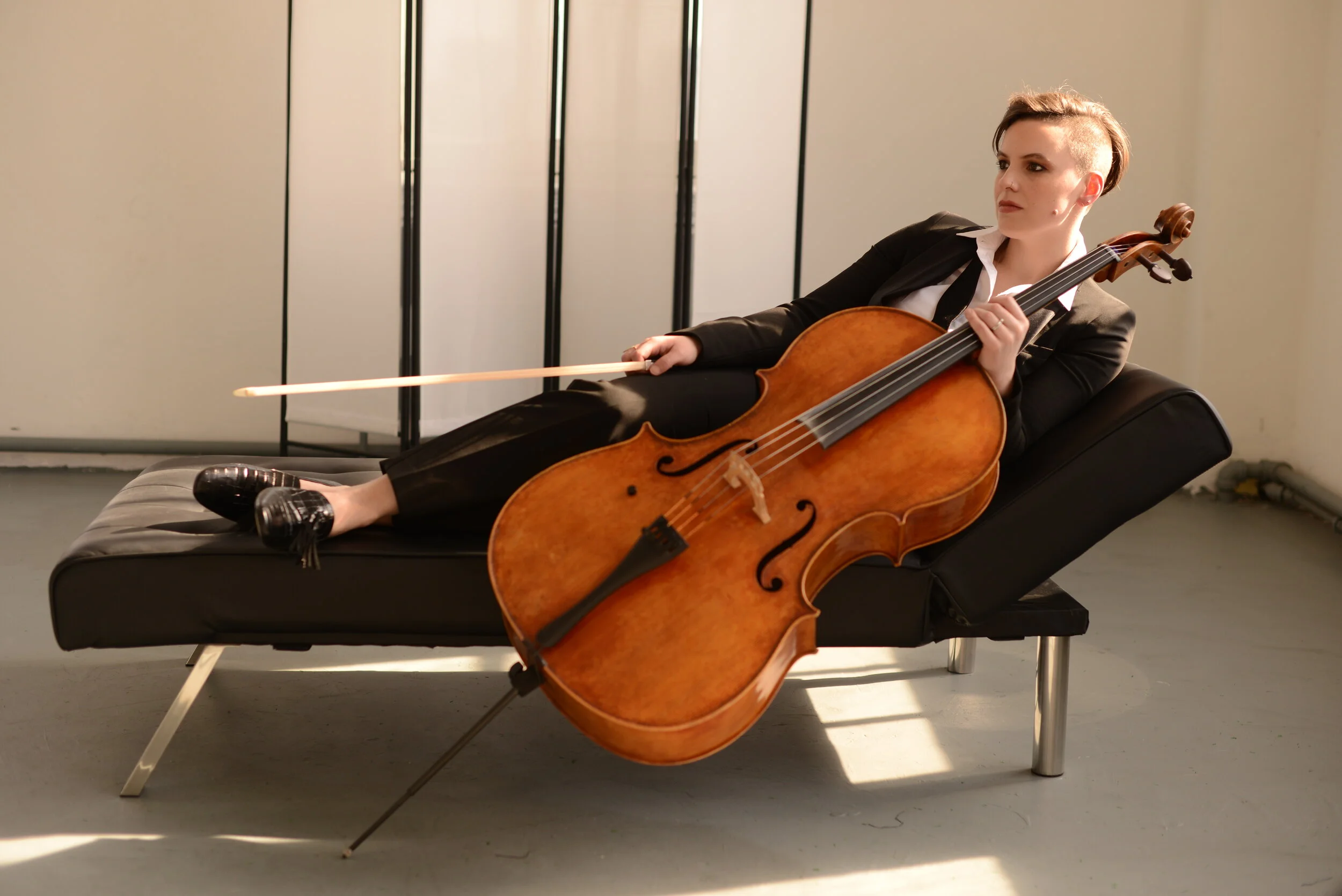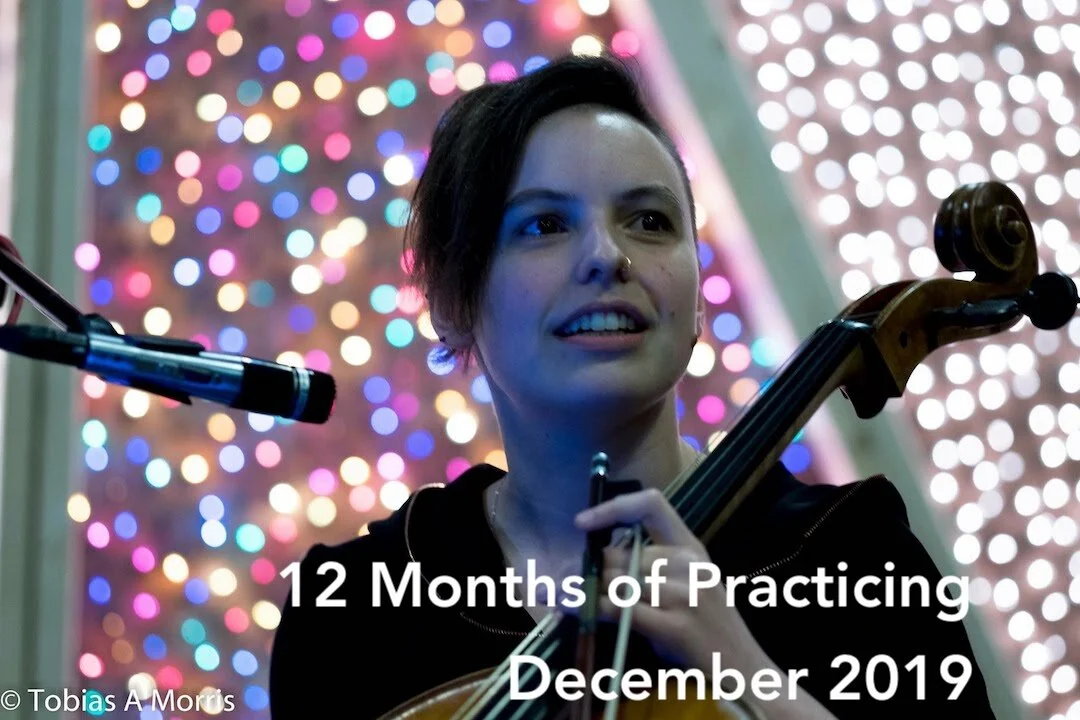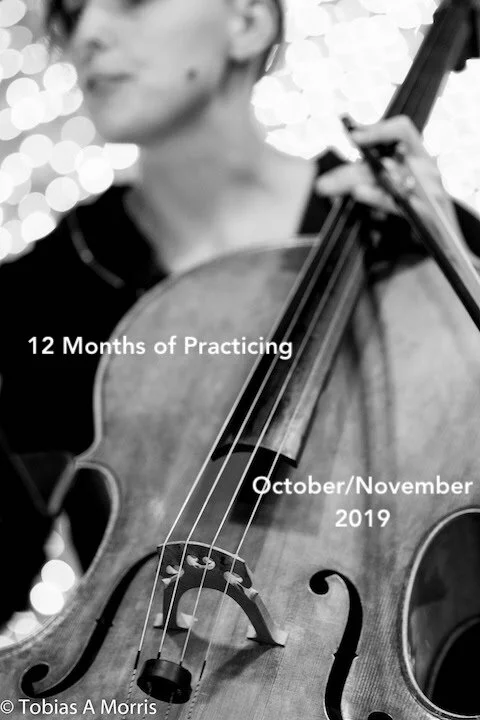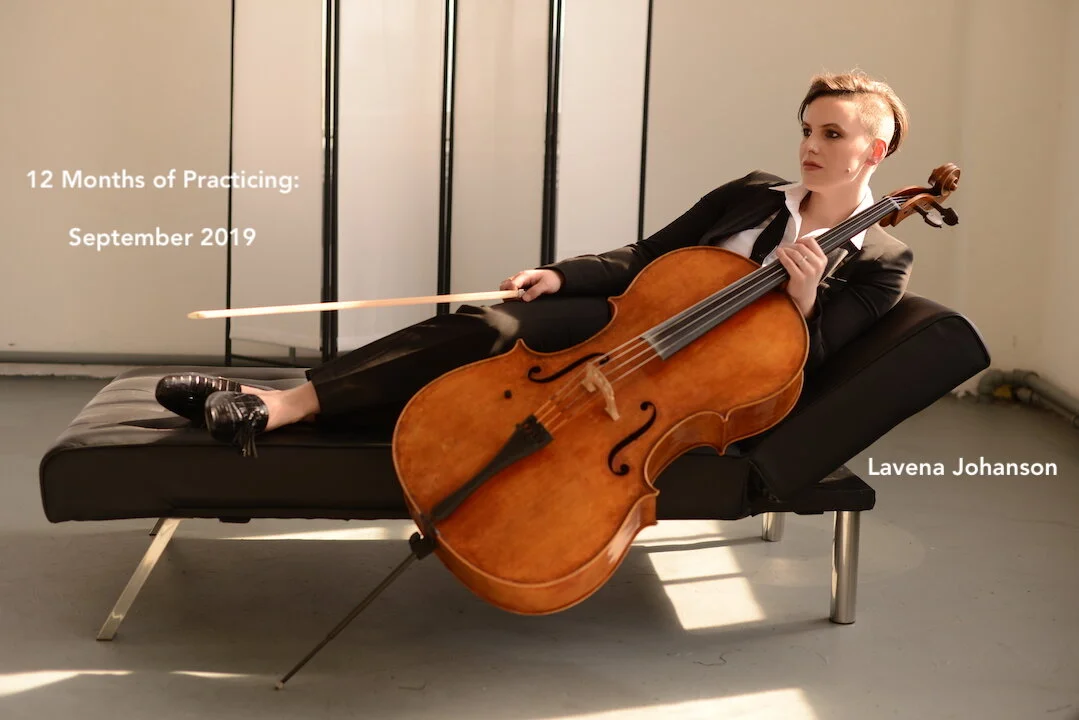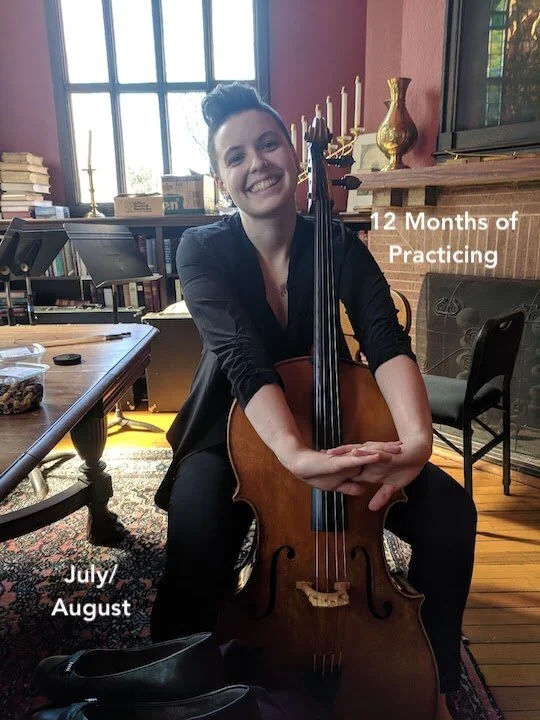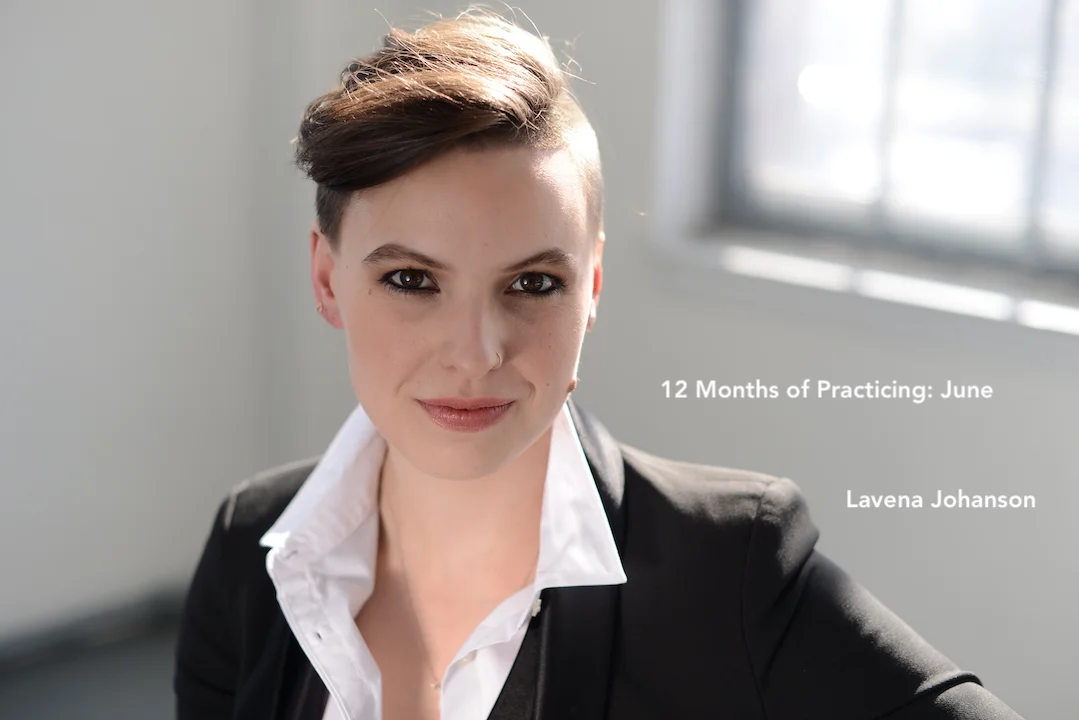Let’s talk more about this Practicing Pre-Game Playlist I made!
First, I should say that I don’t listen to the whole thing every time I practice - it’s over three-and-a-half hours long! I only listen while I’m getting set up, which usually takes about 10-15 minutes. The reason my playlist is so long is because I am continuing to add music as I think of and remember more pieces and songs that inspire me. It started at around an hour of music, and it is still growing today! This is something I really like about the playlist, because it ensures that I will never hear these pieces so many times that I get tired of them.
Also, I don’t start the playlist at the beginning every time. I really like to use the shuffle button, because I’m often pleasantly surprised by what I end up hearing. And because it’s all music I love, I never think to myself, “Oh, I don’t like this one as much, I wish I could skip it.”
I’m not going to write about all the songs in this super-long playlist, but I’d like to share what I think of as my top 10 favorite songs/pieces on the playlist, and tell you why they are especially important to me. If you feel inspired after reading this to make your own Pre-Game Playlist for whatever you’re trying to do, I’d love to hear about it!
10. Different Trains: After the War by Steve Reich, performed by the Kronos Quartet
This whole piece is incredible and worth checking out, but this movement in particular is very meaningful to me. The first time I ever heard it was during my freshman year of college, in a car full of fellow students on our way back to campus from somewhere; most likely we had all gone out to get food together. My friend, who was driving the car, asked us if we wanted to listen to something really cool, and of course we all said yes! He put this on, and I remember being hooked right from the start. I loved it and had to hear more, so I found out what the piece and album were called, and asked my parents to get me the CD for Christmas. It blew me away in so many ways: the way the string quartet and voice recording excerpts were put together, the story that the piece told, and the fact that the guy who wrote this was still alive. This was contemporary music, and I really liked it! Because of that experience, my interest in new music only deepened the more I looked into it, and it’s become a big part of my career and life ever since then. DEAR READER, I EVEN MARRIED A COMPOSER.
9. Shine You No More by Rune Tonsgaard Sorensen, performed by the Danish Quartet
I was introduced to this piece by a friend of mine - it’s very fun, and it reminds me of her. She is leaving Baltimore to go to New York in a couple of months, and every time this piece comes up on my playlist I will think of her playing it in the car for me on the way to one of the many wonderful-but-stressful chamber group rehearsals we had together in 2018-2019.
8. Boy by Ra Ra Riot
I was lucky enough to have the opportunity to tour with Ra Ra Riot twice, and we played this song on every single show. It’s a fun song with a great bass riff, and listening to it brings me back to being on stage, getting to play electric cello for hundreds of people. Definitely one of the coolest gigs I’ve ever gotten to do.
7. String Quartet No. 6 in G Major Op. 101: 3. Lento - attacca: - Live by Dmitri Shostakovich, performed by the Emerson String Quartet
There’s a lot of Shostakovich quartet movements on this playlist, because I was OBSESSED with Shostakovich in my middle school and early high school years. Basically Shostakovich is the classical music version of emo punk rock (which I got into in my later high school years...I had a lot of feelings). I don’t have quite the same attachment to these quartets as I once did, but they are still great pieces and I do enjoy listening to them a lot. I picked this one for my top 10 because it is so simple, beautiful, and sad. This may sound morbid, but ever since I first heard it, I decided that this was what I would want played at my funeral. So, now you know!
6. Arcadiana: VI. O Albion by Thomas Adès, performed by the Calder Quartet
This piece is SO BEAUTIFUL!!! I have not yet gotten to play it, but I would absolutely give anything for the opportunity to do so. I first heard it when I was hanging out with some friends at a coffee shop and one of them said to me, “Listen to this and tell me it isn’t the most beautiful piece you’ve ever heard,” and then put headphones on my ears. Normally I wouldn’t like this, but I was immediately drawn in by the music and decided it was okay, because I was being introduced to something so beautiful that just a minute earlier I had no idea existed.
5. Escape/Chase/Saying Goodbye from E.T. The Extra Terrestrial by John Williams
This movie was a huge part of my childhood, and I always loved the music that plays when the kids are riding furiously on their bikes to escape from the grown-ups and get E.T. back to his spaceship so that he can go home. It also makes me think of my Dad, who likes to play this track over and over again at a very high volume in his car. I actually got to play this with the Baltimore Symphony Orchestra for a Pops concert on which we played a whole evening of famous movie music by John Williams. We did Star Wars and Harry Potter among other things, and it was super fun! But my favorite music on the program was from E.T. It was so fun to play, and it makes me even happier to listen to it because I got to experience playing it with an orchestra.
4. Cello Concerto No. 2 in B minor, Op. 104, B. 191: I. Allegro by Antonín Dvořák, performed by Jacqueline du Pré
There’s a lot of cello music on the playlist (of course!), but this is definitely the most important piece to me in that category. When I was six and first started learning to play cello, I didn’t like it. I had already been playing piano for a year; cello was harder than piano, and I didn’t like being bad at something. As far as I can remember, I hadn’t ever heard anyone play a cello before, so I had no idea what was so great about this instrument that was big and had strings that were hard to press down, and there was a bow I had to hold in a particular way, and none of it made any sense. I just wanted to go back to piano, where all I had to do was sit on the bench and press down the right keys at the right time. Luckily, my Dad (who had and still has an enormous CD collection) decided to give me two CDs of the cellist Jacqueline du Pré playing some of the greatest cello concertos of all time. I remember putting the first one in my CD player, and this track started to play. The orchestra has a three-minute introduction before the cello comes in, and I was intrigued by all of the different sounds and melodies I was hearing, but I wasn’t completely taken in yet. Then du Pré started to play, and I could not stop listening to her. She was incredible. You could tell she was giving this piece everything she had and more. That was when I knew I would do ANYTHING to play cello like that. I immediately decided I liked cello more than piano, and was determined to learn how to play. To this day, du Pré remains my absolute favorite cellist, and I still feel inspired every time I hear this recording.
3. Mountains by Hans Zimmer
My family doesn’t often go out to see movies, but during Christmastime in 2014, we decided to go see Interstellar. I remember thinking that the movie was okay, but the soundtrack was AMAZING. This track in particular accompanies such an epic journey -- it happens during a pretty intense scene in the movie which I won’t spoil -- and I’m a sucker for things that sound epic.
2. Tabula rasa: 1. Ludus: Con moto by Arvo Pärt, performed by Gil Shaham, Adele Anthony, Erik Risberg, the Gothenburg Symphony Orchestra, and Neeme Järvi
I just love this piece. I find it so beautiful. Pärt is one of my favorite composers. I think I was most obsessed with this piece when I was at the Taos Music Festival in the summer of 2010. I listened to it in my room all the time, so it brings me back to being in the mountains in New Mexico. I made a conscious effort to leave the piece alone for a while, because if I listen to a piece for too long I start to get tired of it, and I really didn’t want that to happen with this one. So it’s been really nice to come back to it years later and fall in love with it again.
1. Tinge by Michael Gordon, performed by Todd Reynolds
Last but not least, this piece is just super fun. I love it, and it makes me happy to listen to it. I first heard this in 2009, and like Tabula rasa, I was obsessed and made the decision to put it away for a while. I definitely get the most excited when the shuffled playlist lands on this track, and that is why it is number one! Plus it is the very first song I added to this playlist, so clearly it is my favorite.
